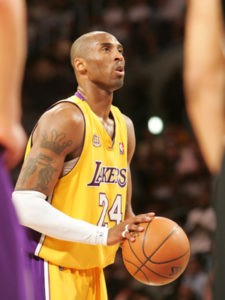The Jan. 26 death of retired NBA star Kobe Bryant touched off a wave of public mourning that transcended social class and grieved many who aren’t sports fans.

Chanequa Walker-Barnes
And that came as no surprise to Chanequa Walker-Barnes, associate professor of pastoral care and counseling at Mercer University’s McAfee School of Theology in Atlanta, Georgia.
She said it’s common for people to grieve celebrities with whom they feel an emotional connection.
“But with Kobe and the public, you can’t get much bigger than that,” she said.
The former Los Angeles Lakers star died in a California helicopter crash which also killed his daughter Gianna, 13, and seven other people.
The mourning was immediate, massive and very public.

Kobe Bryant as an LA Lakers player. (Copyright photo/WDPG share/Creative Commons)
Social media was consumed with Bryant’s life and death as were online, radio and television news and sports shows. The loss even overshadowed programming originally dedicated to the run-up to the NFL’s Super Bowl LIV. He was also memorialized during the Feb. 2 game in Miami.
Bryant’s death also sparked spontaneous memorial observances in and around NBA arenas and led to the postponement of a Lakers-Clippers game. Basketball and other sports stars posted eulogies on Twitter and YouTube and some have gotten inked with Kobe-themed tattoos.
Superstars must mourn, too, Walker-Barnes noted.
“It’s a way for them to have their grief expressed and to have it recognized and validated.”
The pain was just as hard for Bryant fans and others who didn’t know the superstar, she added.
“Anytime we are faced with a loss, even if it is not someone we know directly, it can trigger our own grief,” she said.
Walker-Barnes spoke with Baptist News Global about how Bryant’s loss has turned a spotlight on the complicated ways people process grief. Her comments are included here, edited for clarity.
Why is grief so complicated?
In part, grief is complicated because, as a society and a culture, we don’t do well with it. America tends not to give people time to grieve. We expect people to suffer a loss and to keep right on going with work and life. It is so complicated because we end up repressing or stifling our grief.
Another reason is that being in relationship is core to who we are as human beings, and when we lose someone it causes us to have to shift our world and what the world is to us. All of that is turned upside down.
And grief is complex. It is this very multi-dimensional construct. It is emotional, spiritual, relational and it can be physical.
How did you see that complexity expressed in the public grieving for Kobe Bryant?
It’s striking to see the reaction to the death of Kobe. First, it was a tragic, sudden loss. It was violent and unexpected. A lot of us had very complex relationships with Kobe. He was a distant celebrity figure who as a teen had to make a decision about going to college or into professional sports. I’m not a sports fan but I remember all of America got to weigh in on his future and what he should do – college or the NBA? For that reason, a lot of people have a lot of emotion tied up in Kobe the man, and Kobe the boy. We also saw Kobe accused of sexual assault, and for many people, and especially for survivors of sexual assault, that raises a lot of complicated emotions.
Also, the fact that he died with his daughter brings an additional layer of complexity. Even those who don’t have children have a sense of what it means for his wife and other kids to lose a husband and father and a sister.
What is significant about the ways people have grieved in this situation?
All of it speaks for the need we have for ritual. When we grieve we need to do something with it, whether that is to go to a funeral and gather with other people who are also grieving, or whether it is to go a stadium to leave a token of appreciation for that person.
The grieving also happened online. You see that in the social media posts where people were able to express what the person meant to them. Social media space offers people a place to share and grieve together.
Some NBA and other players are wearing Bryant’s number or have gotten tattoos dedicated to Bryant. Are those common ways to grieve?
For so many basketball players, they watched his game and modeled themselves after him and watched how he led his team. That was a significant way he was touching them. Many were actually close to Kobe. They need to validate that, to express that.
Is it unusual to see an institution grieving, in this case the Los Angeles Lakers?
The Lakers are in this weird position where not only are they grieving as an organization, but they are the carriers of the grief for everybody else. Their responsibility is making room for people to grieve every time they come into that stadium. Even when they play in other cities, it will come up over and over again.
